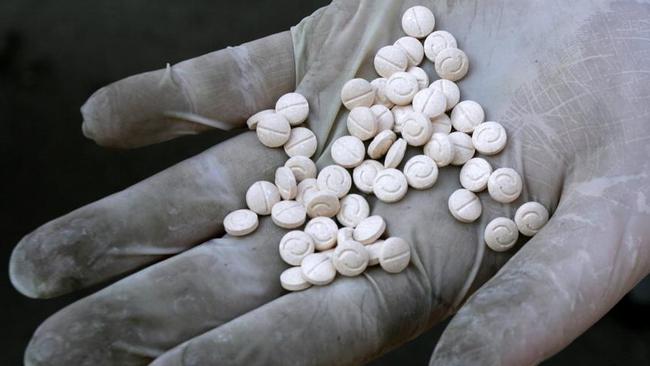source:
http://www.news.com.au/world/middle-east/syria-named-as-huge-producer-of-chemical-courage-drug-captagon/news-story/58e81985d072843a88281e131eec34damiddle eastSyria named as huge producer of ‘chemical courage’ drug Captagon Syrian rebel fighters celebrate after capturing a checkpoint in the village of Anadan.SYRIA is becoming a major producer of a banned amphetamine that gives “chemical courage” to fighters in the country’s civil war and helps them fight for longer, according to the United Nations.
Syrian rebel fighters celebrate after capturing a checkpoint in the village of Anadan.SYRIA is becoming a major producer of a banned amphetamine that gives “chemical courage” to fighters in the country’s civil war and helps them fight for longer, according to the United Nations.The drug, fenethylline — which is more widely known as Captagon — is known for masking fear, pain and hunger, and slows solders’ fatigue during long and arduous battles.
Terrorists who killed 130 people during the Paris attacks in November were believed to have taken Captagon or a similar drug.
Now, the UN believes it is being increasingly trafficked from Syria to other areas of the Middle East.
“We have observed increasing seizures of shipments of Captagon in the countries sharing a border with Syria,” said Masood Karimipour, the regional head of the UN’s Office on Drugs and Crime for the Middle East and North Africa.
The amphetamine has been used to treat attention deficit disorder since the 1960s and was put on a list of controlled substances by the World Health Organisation in 1986.
It has become a popular recreational drug in the Middle East, where it’s sold for up to $20 a pill.
According to the UN, there is anecdotal evidence from former fighters in Syria that suggest the widespread use of the drug among all sides of the civil conflict.
“They recount Captagon as making them feel powerful, fearless and invincible,” Mr Karimipour told The Times.
 Captagon is sold for up to $20 a pill in Syria, which is emerging as a major exporter of the drug
Captagon is sold for up to $20 a pill in Syria, which is emerging as a major exporter of the drug.
“It’s chemical courage.”
A Syrian police officer in Homs, in western Syria, told Reuters he had seen the effects of Captagon on anti-government protesters.
“We would beat them, and they wouldn’t feel the pain,” he said.
“Many of them would laugh while we were dealing them heavy blows.
“We would leave the prisoners for about 48 hours without questioning them while the effects of Captagon wore off, and then interrogation would become easier.”
It induces “a kind of euphoria,” Lebanese psychiatrist Ramzi Haddad told The Guardian.
“You’re talkative, you don’t sleep, you don’t eat, you’re energetic.”
Analysts say the so-called Islamic State terror group is one of the groups believed to be making millions of dollars from trafficking Captagon to other parts of the Middle East.
On the weekend Jordanian border police seized two million Captagon pills and killed 12 gunmen during a battle on the Syrian border.
It was one of several huge seizures of the drug, worth millions of dollars, made by countries bordering Syria.
Turkey reported seizing 11 million pills near the Syrian border in November, while Lebanon said it seized 15 million pills in April and five tonnes in December.
The December seizure also uncovered a production facility in a remote area close to the Syrian border.
Syria was home to a large pharmaceuticals industry before the war, Mr Karimipour said.“If you’re in organised crime, civil war is good for business,” he said.“The profit margins are enormous. “Each [Captagon] pill, made for pennies’ worth of chemicals, is sold on the street for [five dollars] to [20 dollars], depending on that what the market will bear.”
Mr Karimipour said the biggest market was in the Gulf, especially Saudi Arabia, which said it had seized 55 million Captagon pills but admitted that this was only 10 per cent of the total.
Imaduldin Hneithel, former head of the Revolutionary Council in Manbej, near Aleppo, told The Times that rebel forces “aren’t angels” but claimed that drug-taking was more widespread among IS fighters.
“That helps them fight crazily, attack uncovered against strong positions,” said Ahmed Thaljeh, a fighter with the Harakat Nour al-Din al-Zenki brigade near Aleppo.
“They don’t even care about their wounded.”








